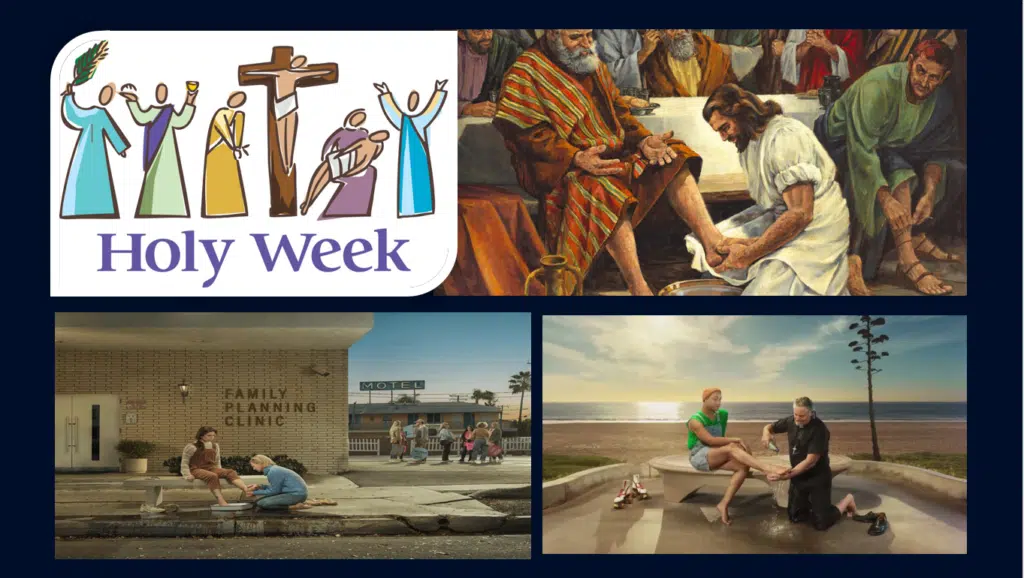
FROM HOLY THURSDAY TO HOLLY WOULD: Christ’s Foot Washing Turned Group Hug
On this Holy Thursday—Maundy Thursday—we don’t just commemorate Christ washing the feet of his apostles; we also confront a modern inversion: the coordinated effort to wash away the memory of what he actually did, what he actually said, and why it all mattered in the first place.
The memory-holing trick distorts not just culture, but sacred liturgy itself.
I caution that this is more a piece for my Catholic friends who don’t know the details they’re about to read. Unlike most of my work here, I make a less directed effort to bridge gaps.
In politics, we’ve witnessed how powerful entities manipulate narratives to reshape perceptions. Consider the controversy surrounding Netflix’s version of The Passion of the Christ, where the pivotal Isaias 53 prophecy — “He was wounded for our transgressions…” —was conspicuously absent. This omission isn’t merely a cinematic oversight; it’s emblematic of a broader agenda to sanitize and secularize foundational Christian truths.
I’ll have more on that story specifically tomorrow.
This tactic isn’t new. It’s the same Mockingbird media machine that’s helped memory-hole everything from JFK to 9/11 now trying to do the same to Isaias’s suffering servant. Historically, operations like Mockingbird have sought to influence media narratives, subtly steering public consciousness away from inconvenient truths, where official accounts often overshadow deeper inquiries and shame to smithereens all those “conspiracy theories.”
Within the Church, this strategy is manifesting in the gradual dilution of sacred traditions. The ritual of foot washing, once a solemn act reserved for Maundy Thursday, has, in some places, devolved into performative displays, sometimes even incorporating door prizes for participants. Such transformations, often justified under the guise of inclusivity or modernization, risk stripping the ritual of its profound theological and historical significance.
LEJEUNE RECENT & RELATED

In 2015, Peter Kwasniewski offered a precise insight into the ritual’s double meaning—both priestly and universal. It’s a reflection that dovetails with what Scott McKay wrote after the “He Gets Us” Super Bowl ad first aired in 2024. The ritual is about service, yes—but service in the shape of Christ and his intentions–his commands–not subservience or ambivalence to sin.
Scripture confirms this. In 1 Timothy 5:10, Paul outlines qualifications for widows, citing the washing of feet as a marker of holiness—not cheap emotional symbolism, but a sign of true discipleship. Said Kwasniewski:
First, we must recognize that Our Lord’s washing of the feet has a double aspect to it, which, it seems to me, accounts for some of the confusion we have managed to introduce by not thinking through how these two aspects are related. One aspect is the washing of the apostles’ feet at their ordination and the first Mass. Here, the accent is definitely placed on the apostolic college as the kernel of the new ministerial priesthood of the new covenant. The other aspect, of course, is the washing of the feet as a symbol of serving one’s fellow man in general, even as Christ came not to be served but to serve and to give his life as a ransom for many.
The bold is where Kwasniewski and McKay intersect. This is true, and certainly Kwasniewski’s article thesis isn’t expansive, but to be clear, Jesus was not subservient to the sin or the sinner. Never. Not ever. He tolerated none of it. He was merciful, yes, but coupled with every act of mercy was this clear command–
Go and sin no more.
In my February 2024 take on the “He Gets Us” campaign, among other things, I wrote the following:
Dare I say it, this line of thinking and false teaching seems to be the great delusion of which God speaks in Scripture. Brotherhood, unity, togetherness–all things Francis focuses on exponentially more than even a mentioning of Jesus Christ as Lord and Savior in much of his [encyclicals]. It is the Masonic religion. It is the religion of Antichrist.
I invite you to look up Annibale Bugnini and his dealings starting in the 1950s, if not the 1940s.
Bishop Athanasius Schneider’s comments in a 2016 interview came with the fire and clarity Catholics need in today’s moral fog. In this age of the gray pulpit of so many shepherds, such black and white assurance comes as an inspiring call to arms:
A typical Catholic parish priest should know well the perennial sense of the Catholic faith, the perennial sense as well of the laws of the Catholic liturgy and, knowing this, he should have an interior sureness and firmness. He should always remember the Catholic principle of discernment: “Quod semper, quod ubique, quod ab omnibus”, i.e. “What has been always, everywhere and from all” believed and practiced.
The categories “always, everywhere, all” are not to be understood in an arithmetical, but in a moral sense. A concrete criterion for discernment is this: “Does this change in a doctrinal affirmation, in a pastoral or in a liturgical practice constitute a rupture with the centuries-old, or even with the millennial past? And does this innovation really make the faith shine clearer and brighter? Does this liturgical innovation bring to us closer the sanctity of God, or manifest deeper and more beautiful the Divine mysteries? Does this disciplinary innovation really increase a greater zeal for the holiness of life?”
As concretely to the innovation of washing the feet of women during the Holy Mass of the Last Supper on Holy Thursday: This Holy Mass celebrates the commemoration of the institution of the sacraments of the Eucharist and the Priesthood. Therefore, the foot washing of women along with the men not only distracts from the main focus on Eucharist and on Priesthood, but generates confusion regarding the historical symbolism of the “twelve” and of the apostles being of male sex. The universal tradition of the Church never allowed the foot washing during the Holy Mass, but instead outside of Mass, in a special ceremony.
By the way: the public washing and usually also kissing of the feet of women on the part of a man, in our case, of a priest or a bishop, is considered by every person of common sense in all cultures as being improper and even indecent. Thanks be to God no priest or bishop is obliged to wash publicly the feet of women on Holy Thursday, for there is no binding norm for it, and the foot washing itself is only facultative.
Bishop Schneider’s razor is a question, simple and searing: Does this innovation rupture the millennial past?
In many places today, the answer is yes. Door prizes, inclusive reinterpretations, and foot-washings divorced from the Eucharist and priesthood aren’t updates—they’re ruptures.
Laywoman Birgit Jones opined on the issue, dated 2014:
And so it is with the optional rite of the Washing of the Feet, Mandatum (command), on Holy Thursday. The rubrics are clear; the washing of the feet instructs that the participants be men (viri), twelve if you want to follow Jesus’ lead. Why twelve and why men, you might ask? Well, because a secondary function of our remembrance of that day (aside from the very important institution of the Eucharist), is the institution of the priesthood, initiated with the twelve apostles. Can women become priests? Contrary to liberal wishes the answer has irrevocably been given by Pope John Paul II. Never!
As has been pointed out by Fr. Z:
“…let it be remembered that the Church’s legislation allows for the washing of the feet of only men. MEN = VIRI = MEN. Not manish women or any other critter. Even if some claim to have received permission to wash the feet of women, and even if the claims were true, those permissions would in no way change the law for the rest of the world. Period. Furthermore, I have never seen a letter or a copy of a letter from the Congregation in Rome granting such a permission. I doubt anyone else has either.”
I will add that last year we saw an exception by Pope Francis, whose position as pontiff gives him that right.
Canon lawyer, Dr. Edward Peters has written about it thoroughly and shares the wording of the rubric with us, along with emphasis of the Latin, in which it was written. The word man (viri) can only be interpreted one way, and it’s not mankind (or humankind).
From laywomen like Birgit Jones to canonists like Dr Edward Peters to hard-nosed priests like Fr Z, the teaching that goes back to apostolic times is clear: the washing of the feet is not a blank canvas for novelty. The Latin rubric says viri.
Men.
Twelve of them.
As in the twelve apostles.
The feminization of the rite—the shift from priestly sacrifice to therapeutic spectacle, from Christ the High Priest to Christ the life coach–is the problem here.
We have no inherent issue with Holly herself.
The enemy isn’t women or children (obviously), but the subversion of sacred order. The main point of the ritual, as Christ implemented it at the time, on Maundy Thursday, is clear: according to Sacred Tradition, it is about the first Mass and the ordination of priests, a line of succession begun there and continued through the letters of St Paul and the Acts of the Apostles.
The “He Gets Us” campaign, while seemingly well-intentioned, exemplifies the trend to whitewash everything true about the world, specifically about the Christian religion. By presenting a sanitized version of Jesus—one that aligns comfortably with contemporary sensibilities and doesn’t involve Jesus or priests doing the washing in the first place—it inadvertently diminishes the radical, transformative nature of his ministry and sacrifice.
As we reflect on the events of Holy Thursday, let us remain vigilant against these subtle erosions of truth. The enemy doesn’t just lie. He deletes. He replaces. He modernizes just enough to make us forget.
He’s been memory-holing truth in politics and the faith for decades. Centuries, really.
It’s just that now in the last century he has emerged curiously successful with it.
But the Church isn’t his to revise. And Holy Thursday isn’t a blank page left open for creator’s whim. It’s the first draft of the Mass. The opening act of Calvary. The ordination of the first priests meant to offer the unbloody Sacrifice of the same Calvary to God the Father with consecrated hands for millennia to come.
The real Jesus gets us more than we get him. He doesn’t just wash feet to comfort. He washes feet to harden them for the road ahead. He washes feet to anoint holy martyrs. He washes feet to chisel soldiers for the cross.
He washes feet before sending forth disciples to die.
—
May everyone named directly or referenced indirectly ask forgiveness and do penance for their sins against America and God. I fight this information war in the spirit of justice and love for the innocent, but I have been reminded of the need for mercy and prayers for our enemies. I am a sinner in need of redemption as well after all, for my sins are many. In the words of Jesus Christ himself, Lord forgive us all, for we know not what we do.



